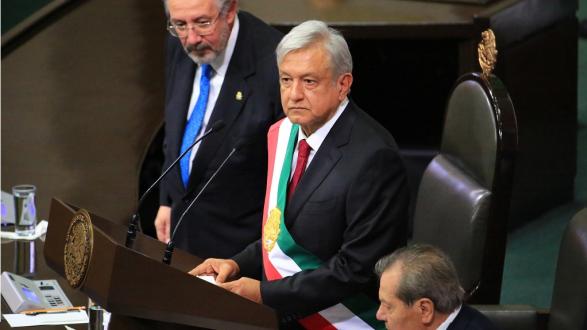Mexico needs a change of regime just as the citizenry demanded and President López Obrador offered. But not any change will do.
For the second time in decades, Mexicans find themselves face to face with the opportunity to modify the regime and build one that responds to the needs of all of the citizens, one that impedes abuse by those in charge of governing - present and future - and that guarantees the stability of the country. Former President Vicente Fox had the first opportunity in his hands but did not have the vision nor the capacity to grasp it. Now, the circumstances have created a new, perhaps last, opportunity to institutionalize the country and truly transform it. The question is whether the new president, Andrés Manuel López Obrador, will promote a transformation towards institutionalization or authoritarianism.
The key question is what does a regime change mean? This is not a play on words. For some, the regime is the person, while for others, the matter lies in the nature of the projects that will drive a given government. In reality, the regime is something very distinct and much more fundamental: it is the way that a society is organized to govern itself.
The question is whether the new president, Andrés Manuel López Obrador, will promote a transformation towards institutionalization or authoritarianism.
On one end is the political system of a country, while another, very distinct from this, is the nature of the regime. Most European nations govern themselves by means of a parliament that reduces the system into two powers (the legislative branch within which lies the executive and the judiciary), while the presidential system is based on separate powers with a president heading the executive branch. The regime is distinct from the system of government: it is the way that the citizens relate with the political system, as well as the mechanisms that allow for their interaction with the system’s diverse components.
Developed countries have formal and informal mechanisms that constitute counterweights so that no component of the system abuses or imposes itself on the others. Of course, each nation has its own characteristics - the product of its history and experience. In this manner, a constitutional amendment in Denmark, to cite a paradigmatic example, can take years because it requires three votes of the parliament and at least one election. In England there is no written constitution but there is a constitutional tribunal that settles differences among powers and advocates for citizen rights. France is distinguished by a hybrid system, with a strong president and a parliament with a prime minister. Each country is different, but the common denominator of all the developed nations is that they incorporate institutional mechanisms and formal institutions that obligate the distinct elements to negotiate, interact, and adhere to transparent procedures in decision making.
There will not be another opportunity. Hopefully AMLO will not squander it by leading the country backward.
Those mechanisms are the essence of the regime of each country because they constitute the way the citizens are protected or unprotected. In a developed country, no government can expropriate an enterprise without just cause, and its decision is subject to judicial review. These mechanisms are designed so that no governmental functionary can abuse his or her faculties to the detriment of a citizen, thus conferring certainty on the citizenry.
If President Trump shouts or becomes angry, the average U.S. citizen does not suffer the consequences in their everyday life. In Mexico’s case, if the President decides on an expropriation and the next day changes the law to justify this, the citizen is absolutely defenseless. Something similar takes place when the government spends more money than it has without an explanation, engendering with this a devaluation, which immediately affects an entire society in the consequent rising of prices and rents. That cannot happen in an institutionalized regime with effective checks and balances, the latter the necessary condition for development.
The regime emanated from the Mexican Revolution consisted of a political system around which everything functioned. That system continues to operate now not only in practice, but also even in the overwhelming legislative numbers accompanying the new president. With that power, President López Obrador can transform the country; the question is whether he will do this in the spirit of polarizing the citizenry or constructing the regime of the XXI century, one that fits the needs of the citizens and the economy, or whether he effects this transformation to consolidate his own power and that of his political group.
Developed countries have formal and informal mechanisms that constitute counterweights so that no component of the system abuses or imposes itself on the others.
In 2000, Fox wasted the opportunity of exchanging the institutionalization of the country for making tabula rasa of the past. The conditions were perfect to achieve this because the Institutional Revolutionary Party (PRI) was terrified that the new president would raze everything, including themselves, to the ground. Something not very distinct is occuring today - the whole country is on tenterhooks, desirous of building a different future. Everything is lined up to construct a new, modern regime, geared to joining all the population together toward a better future. This is the opportunity to break with the unions that hold back the development of the population and the abusive monopolies, with the lack of transparency and with the corruption. There will not be another opportunity. Hopefully AMLO will not squander it by leading the country backward.
________________
Luis Rubio is a Pacific Council member and president of the Mexican Council on Foreign Relations (COMEXI).
This article was originally published by COMEXI.
The views and opinions expressed here are those of the author and do not necessarily reflect the official policy or position of the Pacific Council.




